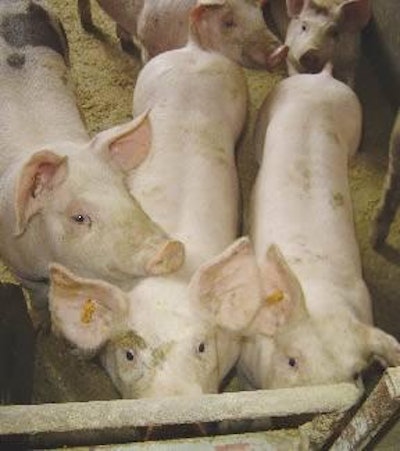
Every producer knows that weaning is the most stressful period in the life of a pig. As a result of having to cope with many social, nutritional and environmental changes, the weaned piglet is less inclined to eat. Dramatic alterations occur to the physical form of the gut and to its microbial population as well as affecting the immunological function.
What we see from the outside is an animal that suffers a setback to its growth. Inside, the lack of feed intake and weight gain leads to an atrophying of the villus projections lining the intestine. The ratio in size between these villi and the crypts between them is reduced and this in turn means a smaller surface area for absorbing nutrients.
At a microscopic level the microbes inhabiting the gut react to the rapid and drastic loss of feed material that would be the substrate for their fermentation. They become unbalanced and a formerly large diversity of types decreases markedly. All this gives a chance to opportunistic pathogens. Previously controlled by maternal antibodies called immunoglobulins (and especially the type IgA), can now multiply and colonise the gut — with the most common outcome being that the pig suffers post-weaning diarrhoea.
Stimulation from a probiotic
The full course of these events is now well-documented. Knowledge about the counterbalancing effects of including probiotics in the piglet feed is less comprehensive so far. But notable information has appeared recently regarding one probiotic, known as B. toyoi and based on viable spores. For more than 20 years this feed product has been seen to have a beneficial effect on gut microbiota and health status, particularly in pigs. Now the latest laboratory studies confirm a direct action against harmful gut bacteria while stimulating the number of helpful lactic acid bacteria.
Furthermore, research has demonstrated an immuno-modulatory action of B. toyoi at both systemic and intestinal levels when administered to sows and piglets. An increase has been found in the production of specific immune cells and of immunoglobulin IgA.
This came in work by a research group of the Free University of Berlin in Germany. They gave the probiotic in its proprietary form (Toyocerin) to sows in early pregnancy (from 25 days after insemination) and also allowed piglets free access to supplemented feed beginning on Day 15 after farrowing. These piglets received the same supplement at and after weaning. However, significant quantities of the spore were already detected in their faeces before they had access to the feed, demonstrating that viable spores were being transferred to the progeny by the sows' faeces. By this way, B. toyoi could start its beneficial action even in advance of the piglets starting to eat solid food.
The German researchers began studying the immune response by recording the total IgA content in the faeces and the total IgG in the blood of the sow before and after weaning. Next, the same parameters were determined weekly in piglets, from birth to 56 days old. Histological samples of the piglets' gut mucosa were taken to assess the populations of T and B immune cells.
In sows, feed supplementation led to a clear increase in faecal IgA. Extra immunoglobulin from the sow would mean a more successful mucosal defence against opportunistic pathogens in the gut of piglets whose mothers were fed the probiotic supplement. Increases in specific gut lymphocytes were also found in weaned piglets, including significantly enhanced numbers of protective intra-epithelial CD3+/CD8+ T cells in the intestinal epithelium together with more CD25+ cells and T cells in the gut lamina propria.
First line of defence
These findings add up to an indication that the piglets would be more likely to stay healthy in the face of common challenges during the post-weaning period. The immunoglobulin IgA is the first barrier in the young animal's gut against the entrance of pathogens. The presence of a higher quantity of specialised T cells in the gut lamina propria of piglets before weaning points to an accelerated immune development so that potential pathogens can be recognised earlier, followed by increased lymphocyte maturation and consequently a higher immunoglobulin production.
Therefore the suggestion here is that the spores of the probiotic supplement stimulated an early immune response in piglets so they could overcome the challenges of weaning. A clear immuno-stimulatory effect was demonstrated by a recent study in which there were more lactic acid bacteria and fewer E. coli in piglets fed B. toyoi. A publication this year suggested that the production of enzymatic compounds seemed to be behind this effect. The supplementation's bio-regulatory effect on the gut microbiota had already been seen in the modified microbial profile of piglets receiving B. toyoi, with additions in the number of beneficial gut bacteria such as lactobacilli and bifidobacteria.
How all this is reflected in piglet health and performance? Various symptoms can be taken as indicators of a health status, but probably the most significant at this early age are the presence of diarrhoea and high levels of pathogenic bacteria in faeces. Both parameters have shown a clear response to the administration of the probiotic. In the trial described before, the E. coli pathogenic serogroups were identified in the faeces of the sows and piglets. Interestingly, whereas piglets of the control group harboured 7 of the 9 serogroups found in maternal faeces samples, only 2 of these 9 pathogen-associated serogroups were isolated from piglets receiving Toyocerin in the diet.
Such a finding reinforces the results obtained from studies indicating inhibition of the growth of E. coli in the pig gut. As expected, this response was reflected in a clear reduction in the incidence of liquid faeces and post-weaning diarrhoea in those piglets by 38% and 59% respectively. Performance parameters improved by 11% for average daily gain and 8% for feed efficiency. In our view, therefore, administering the probiotic to sows and progeny inhibited pathogenic bacteria in the piglets and enhanced their immune system at weaning so they were better for gut health and growth performance.





.jpg?auto=format%2Ccompress&fit=crop&h=167&q=70&w=250)











